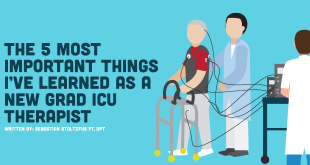In physical therapy school, my prosthetics class basically came and went. I didn’t know anything about prosthetics rehab and had no experience working with prosthetics. In my work as an aide and during my volunteer hours, I never encountered a patient with an amputation or saw someone learn how to use a prosthetic. Lucky for me, all of this changed during my third clinical. For this rotation, I had to pick a “unique” site that couldn’t be a typical outpatient orthopedic facility. Since I wasn’t interested in inpatient care, I was not left with many options. I only panicked a little…
After combing through the short list of eligible facilities, I finally found a setting that fulfilled my school’s requirement. This outpatient clinic was certainly unique. The patient population they treated was split into thirds. 1/3 of the patients they saw were your typical orthopedic cases. More interestingly, 1/3 of the patients they saw had neurological issues like Parkinson’s disease, spinal cord injuries, multiple sclerosis, etc. But most fascinating, the remaining 1/3 of the patients they saw had various lower extremity amputations and were learning how to use prosthetics. I was sold. I put in my request and hoped that I would get lucky.
What I didn’t know at the time was that this was the only facility in my area that specializes in prosthetics rehab. This rotation was truly a one-of-a-kind learning experience.
Fortunately, I was the only student who requested this site, and everything was set. Once the rotation started, I quickly found myself immersed in a brand new world with many things to learn. I was certainly up for the challenge. I loved the experience so much that when I was offered a job after I graduated, I immediately said yes. Prosthetics rehab was never on my radar prior to this rotation, but I am now so grateful that I get to work in this type of setting. Here are 5 reasons you should also consider getting into prosthetics rehab.
1. Prosthetics rehab is a growing niche
Approximately 185,000 people undergo an upper extremity or a lower extremity amputation each year, and in 2005, 1.6 million people were living with an amputation. In addition, according to Ziegler-Graham et.al., the number of people living with amputations will double by 2050, secondary to the growing prevalence of diabetes and other vascular conditions. This is a huge number of people that will benefit from our services.
2. Prosthetics rehabilitation is a natural fit for physical therapists
In the musculoskeletal world, PTs have several competitors that occupy the space with us. These competitors include chiropractors, osteopaths, massage therapists, and athletic trainers. However, we are the ideal profession to work with patients with prosthetics because the field leverages a great deal of the knowledge and skills we possess. Working with these patients requires extensive knowledge in the musculoskeletal, cardiovascular, integumentary, and neurological domains, as well as knowledge in biomechanics and the latest technology in prosthetics.
3. Prosthetic technology is evolving and we can be intellectual leaders in the field
Current technology in prosthetics is already astonishing, but the field is growing and things are constantly changing. Osseointegration, 3D printed prosthetics, limbs that can provide sensory feedback, neural interfaces with chips planted directly on people’s brains, and even limbs made out of LEGO are some of the newest trends.
The prosthetics field is essentially the merger of the human body and machine. While this sounds futuristic, it is the direction the field is headed in. Getting into the prosthetics field as a physical therapist provides you with a unique opportunity to be at the forefront of new technology and allows you to work with patients who previously would have been seriously disabled for their entire lives.
4. Since prosthetics is somewhat of a niche field in physical therapy, it can help you differentiate yourself
When advancing your career, it is always beneficial to have unique experiences and work in non-traditional settings. Employers value employees with diverse backgrounds, interests, and skills, all of which you will gain while working in the field of prosthetics rehab.
5. Working with patients with amputations is uniquely rewarding
In my experience, patients with amputations are highly motivated and are extremely happy to finally start to walk again. There is nothing like walking with a person for the first time after many years of being confined to a wheelchair. To see a patient with a hip disarticulation go from not walking at all to ambulating without an assistive device while carrying 45-pound weights is incredibly inspiring. I am currently working with a patient whose main goal is to be able to walk into her granddaughter’s baby shower while holding a gift.
I have worked with all types of patients: young, old, below-knee amputations, above-knee amputations, bilateral amputations, and many more. It is a gift to have the opportunity to make positive changes in these people’s lives.
Getting out of your comfort zone
Right now, you may be like I was during my clinicals. I knew nothing about prosthetics rehab and it was something that I never considered or thought about. But I took a risk and signed myself up for something that was foreign to me. Unknowingly, this was one of the best decisions I have made thus far in my career as a physical therapist. I got a unique opportunity and I landed myself in a setting that is intellectually stimulating and extremely rewarding.
References
Ziegler-Graham K, MacKenzie EJ, Ephraim PL, Travison TG, Brookmeyer R. Estimating the prevalence of limb loss in the United States: 2005 to 2050. Arch Phys Med Rehabil 2008;89:422-9.
Prosthetic Limbs, Controlled By Thought, The New York Times, https://www.nytimes.com/2015/05/21/technology/a-bionic-approach-to-prosthetics-controlled-by-thought.htm
Rhodes, Maragaret, Lego Makes Everything Better—Even a Prosthetic for Kids, https://www.wired.com/2015/07/lego-makes-everything-bettereven-prosthetic-kids/
 NewGradPhysicalTherapy.com The Largest Online Resource For New Grad Physical Therapists
NewGradPhysicalTherapy.com The Largest Online Resource For New Grad Physical Therapists







Hi Nicolas,
I would like to preface my comment by saying that I am currently an Orthotics and Prosthetics student at Baylor College of Medicine, and NOT a physical therapist or PT student. Our fields do share some degree of overlap however, and I was bit disappointed to see that there was no mention of the prosthetist in this article. My classmates and I have been lucky to have a few courses instructed by physical therapists, as well and guest lectures and seminars given by physical therapists, and we are always excited to better understand and develop the link between these two fields. As many healthcare professionals believe, there is benefit to all patients in experiencing team based care, and the prosthetist is a crucial piece of the rehab puzzle for individuals with amputations.
That being said, I think this is a wonderful article for any practitioner looking to get into amputee rehab; each of the reasons you described contributed to my interest in working with amputees!
Absolutely, and we work very closely with the prosthetists that refer patients to us. The point of the article was to educate physical therapists on a niche specialty in the PT world. I have some additional content coming out and in it I encourage therapists entering into this specialty to work very closely with prosthetists. Collaboration between us is critical for optimal patient outcomes. Thanks for reading!